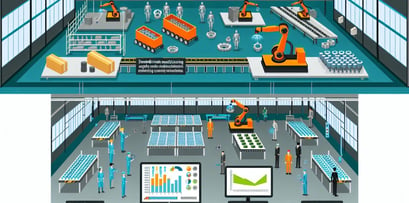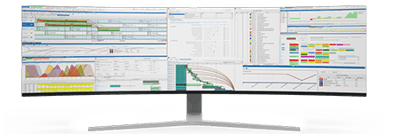Embracing Demand-Driven Manufacturing
The role of an Operations Director is increasingly challenging in industrial manufacturing. The traditional approach to manufacturing, marked by forecast-based planning and inventory-centric operations, is no longer sustainable in the face of dynamic market demands, supply chain disruptions, and technological advancements. To thrive in this environment, industrial manufacturing facilities must adopt a demand-driven approach that aligns production with actual customer demand.
In this blog, we'll explore the principles of demand-driven manufacturing and how integrating advanced planning and scheduling software like PlanetTogether with ERP, SCM, and MES systems can drive operational excellence.

Demand-Driven Manufacturing
Demand-driven manufacturing is a methodology that prioritizes customer demand signals over forecasts and inventory levels to drive production decisions. At its core, it focuses on responsiveness, flexibility, and efficiency throughout the entire supply chain. Instead of relying on static forecasts, demand-driven manufacturers leverage real-time demand signals, such as orders, sales data, and market trends, to make informed decisions about production scheduling, inventory management, and resource allocation.

Key Principles of Demand-Driven Manufacturing
Customer-Centricity: Demand-driven manufacturers prioritize customer satisfaction by aligning production with actual demand. By closely monitoring customer orders and preferences, they can quickly adjust production schedules and product configurations to meet changing market demands.
Dynamic Scheduling: Traditional manufacturing approaches often rely on fixed production schedules based on long-term forecasts. In contrast, demand-driven manufacturing employs dynamic scheduling techniques that allow for real-time adjustments based on changing demand, resource availability, and production constraints.
Lean Inventory Management: Excess inventory ties up valuable capital and increases the risk of obsolescence and waste. Demand-driven manufacturers optimize inventory levels by adopting lean principles such as Just-in-Time (JIT) production, Kanban systems, and vendor-managed inventory (VMI) arrangements.
Collaborative Supply Chain: Demand-driven manufacturing emphasizes collaboration and visibility across the entire supply chain ecosystem. By integrating suppliers, distributors, and other stakeholders into the production process, manufacturers can better anticipate demand fluctuations and mitigate supply chain disruptions.
Continuous Improvement: Continuous improvement is a fundamental aspect of demand-driven manufacturing. By regularly reviewing performance metrics, analyzing root causes of inefficiencies, and implementing corrective actions, manufacturers can drive ongoing optimization and innovation.
![]()

Integration of PlanetTogether with ERP, SCM, and MES Systems
To effectively implement demand-driven manufacturing principles, industrial manufacturing facilities require robust planning and scheduling capabilities. PlanetTogether, a leading advanced planning and scheduling (APS) software, offers powerful features designed to optimize production schedules, maximize resource utilization, and minimize lead times.
Integration between PlanetTogether and ERP, SCM, and MES systems enhances the effectiveness of demand-driven manufacturing initiatives by providing seamless data exchange and interoperability across various operational functions.
Let's explore how integration with leading ERP, SCM, and MES platforms such as SAP, Oracle, Microsoft, Kinaxis, and Aveva can drive operational excellence:
SAP Integration: Integration between PlanetTogether and SAP enables real-time synchronization of production schedules, inventory levels, and resource allocation data. This integration streamlines order processing, enhances visibility across the supply chain, and facilitates better decision-making based on accurate and up-to-date information.
Oracle Integration: By integrating PlanetTogether with Oracle's ERP and SCM solutions, manufacturers can achieve end-to-end visibility and control over their production processes. This integration enables seamless data flow between planning, execution, and monitoring systems, enabling proactive identification and resolution of production bottlenecks and inefficiencies.
Microsoft Integration: Integration between PlanetTogether and Microsoft Dynamics ERP provides manufacturing facilities with a comprehensive solution for demand-driven planning and scheduling. Leveraging the power of Microsoft Azure cloud platform, this integration offers scalability, flexibility, and real-time collaboration capabilities to optimize production operations.
Kinaxis Integration: PlanetTogether's integration with Kinaxis RapidResponse enables manufacturers to leverage advanced analytics and scenario planning capabilities for demand forecasting and capacity optimization. This integration facilitates data-driven decision-making and enables proactive management of supply chain risks and disruptions.
Aveva Integration: Integration between PlanetTogether and Aveva's MES solutions enables seamless coordination between production planning and shop floor execution. This integration ensures that production schedules are accurately translated into actionable tasks, and real-time production data is fed back into the planning process for continuous optimization.
Benefits of Integration
The integration of PlanetTogether with ERP, SCM, and MES systems offers several key benefits for industrial manufacturing facilities:
Improved Operational Efficiency: By synchronizing planning, scheduling, and execution processes, integration enables smoother operations, reduced lead times, and increased throughput.
Enhanced Visibility and Control: Integration provides real-time visibility into production status, resource utilization, and inventory levels, empowering decision-makers to proactively address issues and optimize performance.
Streamlined Collaboration: Integration fosters collaboration across functional areas and stakeholders, facilitating seamless communication and alignment of goals and objectives.
Increased Agility and Responsiveness: Integration enables rapid adaptation to changing market conditions, customer preferences, and supply chain disruptions, ensuring that manufacturing facilities remain agile and responsive.
Optimized Resource Utilization: By optimizing production schedules and resource allocation, integration helps minimize idle time, reduce waste, and maximize overall efficiency.
Demand-driven manufacturing represents a paradigm shift in how industrial manufacturing facilities operate and compete in today's global marketplace. By prioritizing customer demand signals, embracing dynamic scheduling techniques, and leveraging advanced planning and scheduling software like PlanetTogether, manufacturers can achieve operational excellence and stay ahead of the curve.
Integration with leading ERP, SCM, and MES systems further enhances the effectiveness of demand-driven initiatives, enabling seamless data exchange, improved visibility, and streamlined collaboration across the entire supply chain ecosystem.
As an Operations Director, embracing demand-driven principles and leveraging integrated technology solutions is essential for driving success in the increasingly complex and competitive world of industrial manufacturing.
Are you ready to take your manufacturing operations to the next level? Contact us today to learn more about how PlanetTogether can help you achieve your goals and drive success in your industry.
Topics: Industrial Manufacturing, PlanetTogether Software, Integrating PlanetTogether, Streamlined Collaboration, Improved Operational Efficiency, Enhanced Visibility and Control, Optimized Resource Utilization, Increased Agility and Responsiveness, Demand-Driven Manufacturing




















LEAVE A COMMENT